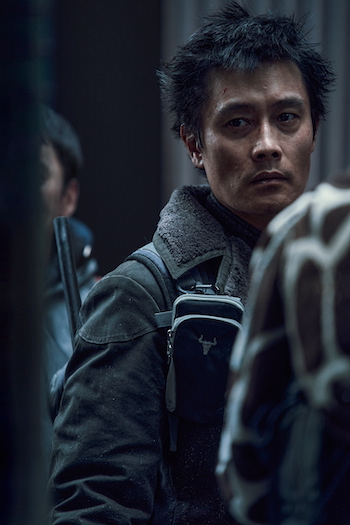Film Review: “Concrete Utopia” — No Room at the Top
By Steve Erickson
Concrete Utopia echoes Parasite’s sharp critique of class exploitation, but it applies a faster pace and more restless energy to its vision of economic meltdown.
Concrete Utopia, directed by Um Tae-hwa. Opens at AMC Boston Common 19 and elsewhere in New England on December 15.

A scene from Concrete Utopia.
The South Korean sci-fi film Concrete Utopia tints the apocalypse a steely shade of blue.
The film’s narrative conceit is that a disaster strikes all of Seoul, apart from the Hwang Gung apartments, a huge complex. No explanation is given for the mega-destruction, beyond signs of a massive earthquake and subsequent fires. (There are suggestions that the destruction is global. ) Director Um Tae-hwa has tinted the building’s apartments a deep monochrome. The exteriors are given an uncanny, unnatural look: distant smoke colors the sky an unnerving shade of orange. Rubble surrounds the apartment complex for miles around. The set required the construction of a real three-story building; it is a convincing space for the action, yet it has been fashioned to look somewhat unreal. Thankfully, the combination of CGI and sets never looks overly slick or cartoonish.
Among a large cast, with hundreds of extras huddled in crowded shots, Concrete Utopia zooms in on three characters. (The others are far less carefully developed.) Young-tak (Squid Game actor Lee Byung-hun) becomes the building’s leader; he is elected as its Delegate after he extinguishes a fire. (His background is initially mysterious, but we are fed details via some flashbacks.) Civil servant Min-sung (Park Seo-joon) and his wife Myung-hwa (Park Bo-yong) often disagree about the right course of action to take, but they are always working, together, in the overwhelming struggle for survival. And it is a deadly serious fight: the building offers physical shelter that doesn’t ensure that its toilets function. The threat of starvation underlies every strategic move, given that the apartment dwellers receive increasingly small rations.
At first, the disaster offered the possibility of creating some sort of democratic equality, but Young-tak (Lee Byung-hun) quickly abuses his authority and power. He leads the building’s tenants as they fist bump while chanting “Our apartments belong to the residents!” The old ways are dismantled with no healthy alternative in sight. A congressman is kicked out, left to freeze in the cold. The collapse of Seoul’s government leads to a sharpening division between the classes — tensions that already existed are pushed to violent rupture. The apartment building’s tenants cling to their privileges as residents, disdainful of outsiders who are attempting to keep alive. The decision is made to let those outside of the building die in the frigid ruins.
Concrete Utopia is obviously an allegory, but it serves up a few different metaphoric strands to pick from. A lot of issues are juggled: the relationship between North and South Korea, xenophobia, authoritarians who profit from desperate circumstances, and society’s murderous contempt for the poor and unhoused. (Underlining the second and third points, the elected Delegate refers to outsiders to the apartment building as “cockroaches.”) Of course, these problems aren’t just Korea’s: the contempt many of the film’s characters hold for anyone who is poor is global. A satiric streak of Christian imagery is present most directly via sunlight that glares through a stained glass window of Jesus and his apostles.
Concrete Utopia echoes Bong Joon-ho’s exploration of similar themes about class exploitation, especially in 2013’s Snowpiercer’s sci-fi setting, but Um Tae-hwa, adapting a part of Kim Sungnyung’s webtoon Pleasant Outcast, applies a faster pace and restless energy to its chronicle of economic Darwinism. Still, the film’s ideas come second to its cinematic style. Um and D.P. Cho Hyoung-rae do their best to use the elaborately designed setting as thoroughly as possible. Images of the tower emphasize how it dominates the debris and people outside it, psychologically, spiritually, and visually.
Politically, the apartment building stands as a microcosm of South Korea society today. (Min Joo Kim’s Washington Post article “Gangnam Style Vs. Squalor” describes the shacks and luxury dwellings in the Seoul neighborhood that inspired the metaphor that underlies Concrete Utopia.) The international success of Parasite has led to a wave of movies and TV shows about the inequities of the 1% that, for the most part, are toothless. Concrete Utopia is hardly the first disaster movie in which panic trumps morality. But this vision of a “utopia” smashed to pieces is more disturbing and believable than most.
Steve Erickson writes about film and music for Gay City News, Slant Magazine, the Nashville Scene, Trouser Press, and other outlets. He also produces electronic music under the tag callinamagician. His latest album, The Bloodshot Eye of Horus, was released in November 2022, and is available to stream here.
